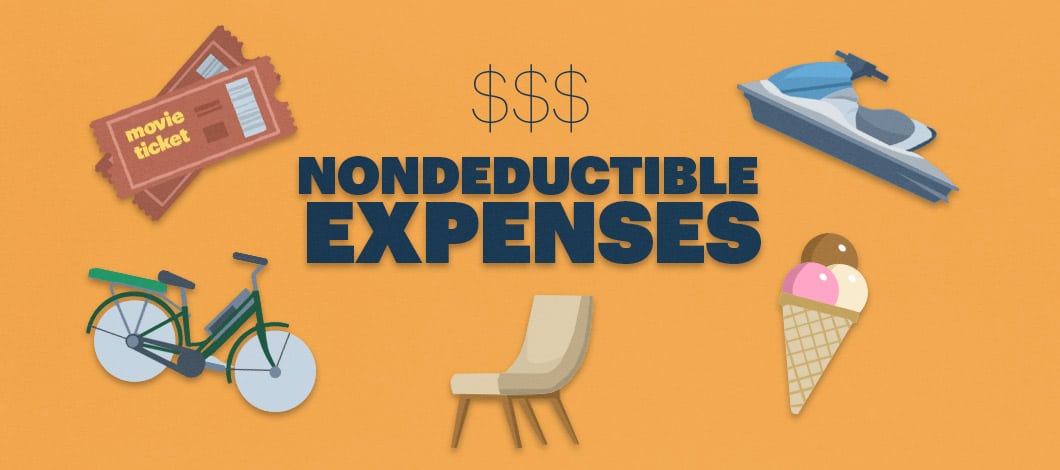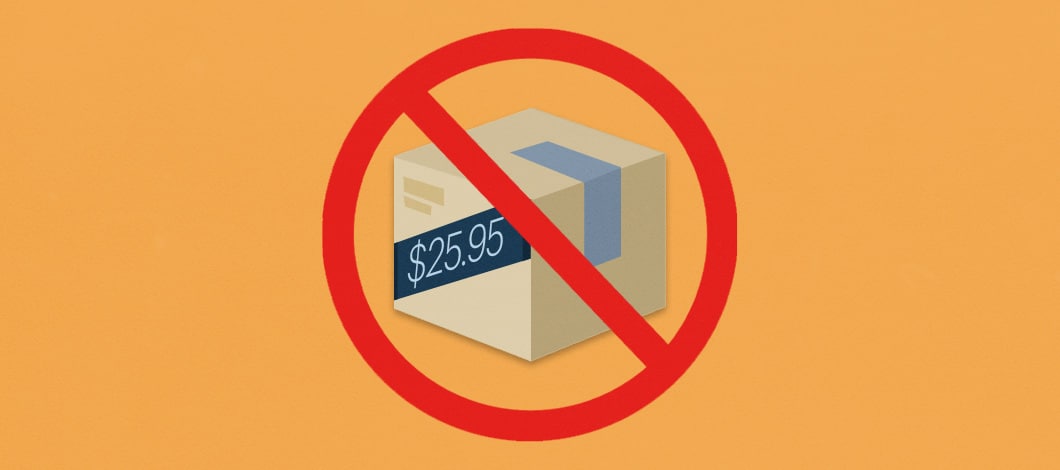Some business expenses are deductible, but others aren’t. Not knowing the difference can cost you money and get you into trouble.
Learn the difference between deductible and nondeductible expenses. Here we’ll start by covering what nondeductible business expenses are and how they differ from deductible expenses. Then we’ll provide a list of nondeductible business expenses and an explanation of why they can’t be deducted.
What Are Nondeductible Expenses?
The Internal Revenue Service (IRS) defines business expenses in terms of the ordinary and necessary costs of carrying on a for-profit trade or business. Expenses that are classified as ordinary and necessary business expenses generally may be deducted, while others don’t qualify for deductions. The latter are classified as nondeductible business expenses.
The line between allowable and disallowable expenses for corporation tax purposes is determined by the definitions of ordinary and necessary:
- An ordinary expense is one that is common and acceptable in a trade or business. For example, paying employee wages is an ordinary part of running a restaurant business, while paying for recreational trips to Las Vegas isn’t.
- A necessary expense is one that is helpful and appropriate for running a trade or business. For example, renting office space is helpful and appropriate for running an accounting firm, while buying a second home with company funds isn’t.
Note that despite the name, a necessary expense doesn’t have to be indispensable to qualify as helpful or appropriate. To illustrate the difference, you may be able to run your company out of a tiny office, but if you decide to rent more office space, the cost is still a necessary expense, provided the additional space is being used for business.
Essentially, ordinary and necessary expenses define deductions that are untaxed. Business income tax nondeductible expenses include anything which falls outside these guidelines.

What Expenses Are Not Tax Deductible?
What falls outside the scope of ordinary and necessary expenses includes a number of general categories encompassing numerous individual items. Broad categories which are nondeductible include:
- Personal expenses which aren’t related to for-profit business activities, including costs of hobbies, recreation, nonwork travel expenses and nonwork meal and entertainment expenses
- Capital investments, including startup costs
- Costs of goods sold that already have been deducted in inventory calculations
Here’s a breakdown of some individual items which can fall into these broad groupings. Note that technical considerations apply for certain items. For detailed questions, see official IRS publications such as IRS Publication 535 or consult your accountant or tax professional with detailed questions.
Personal, Living or Family Expenses
Nonbusiness expenditures for personal items, living expenses or family expenses may not be deducted. However, for items that are used partly for personal reasons and partly for business reasons, you may deduct the percentage used for business purposes.
For example, if you take out a loan and use half of it for your business and half for a personal vacation, you can deduct the half used for business.
Special rules apply to business usage of your home or car. For information on claiming home office deductions, see IRS Publication 587. For information on business use of your car, see IRS Publication 463.
Hobby Expenses
The IRS classifies hobbies as nonprofit activities done primarily for pleasure, recreation or sport rather than money. It uses 9 different criteria to evaluate whether an activity is a hobby, such as whether you depend on the activity for your livelihood, whether you conduct it in a businesslike manner and whether the activity is profitable. For details, consult IRS guidelines.
Recreational and Social Club Expenses
If you belong to an organization such as a country club or fitness club for personal reasons and you sometimes take business associates or clients to the club, the IRS still regards this as a personal expense rather than a business expense.
Commuting Costs
In general, the cost of commuting to and from work is considered a personal expense rather than a business expense. However, certain types of business travel are deductible. For example, if you travel between branch locations or you travel to meet customers, these are considered business expenses.
Travel Expenses for Extra Travelers
Qualifying business travel expenses such as flights to business events are deductible. However, if you take family or friends with you on a business trip, their expenses aren’t deductible.
Meal and Entertainment Costs
For business meals, such as lunch with employees, only half of qualifying expenses may be deducted. Associated entertainment costs may not be deducted, which is a change from previous rules. For details, see IRS Publication 463.
Taxes and Tax Fines and Penalties
You can’t deduct federal income taxes because these are based on your personal income rather than your business income. Certain federal, state, local and foreign taxes directly related to your business can be deducted.
For example, if you have employees, you can deduct the business portion of your payroll tax. Certain types of business organizations may deduct state income taxes on business tax returns. Rules in this area can be complex, so consult your tax professional if you intend to claim this type of deduction.
Legal Fees
Only legal fees which are incurred in the course of ordinary and necessary business may be deducted, explains the Boyer Law Firm. Personal legal fees may not. For example, legal fees associated with commercial real estate may be deducted, but fees from residential real estate transactions may not.
Startup Expenses
Expenses that are considered an investment in your business are handled differently than other types of expenses for accounting and tax purposes. Most deductible expenses are expenses used to run your daily operations, known as operating expenses. Expenses that involve a long-term investment in your business are called capital expenses and involve a different set of tax procedures that spread deductions out over a number of years.
Startup expenses generally are classified as capital expenses. However, you may elect to deduct certain startup costs. For details, see IRS Publication 535.
Capital Purchases
As with startup expenses, investments in capital assets are deducted over a number of years rather than through the procedures used for operating expenses. For example, commercial real estate purchases, major equipment purchases and improvements to facilities wouldn’t be deductible as operating expenses.
Costs of Goods Sold Already Deducted
If your company manufactures products or resells them, your annual inventory counting procedures may involve counting the value and cost of goods sold at the beginning and end of each year. If you deducted an expense while calculating the cost of goods sold, you can’t deduct it again when claiming business expenses. However, there are exceptions and rules governing this area are complex, so consult your accountant.
Extra Insurance Policies
Ordinary and necessary business insurance policies such as worker compensation may be deductible. Extra insurance policies such as additional life insurance may not.

Gifts Exceeding $25
Business gifts to employees or customers may be deducted for amounts up to $25 per person. Gifts that could be considered as entertainment generally count as entertainment and can’t be deducted.
Political Contributions
Political donations aren’t eligible as business deductions. This includes lobbying expenses.
Costs of Illegal Activities
Illegal activities such as money laundering aren’t eligible for business deductions.
Know Your Eligible Deductions to Avoid Tax Hassles
The line between which expenses are eligible for tax deductions and which aren’t is defined by which costs are ordinary and necessary to run a for-profit business.
Nondeductible expenses generally include nonbusiness expenses, investments in capital assets and inventory assets which already have been deducted from the cost of goods sold. Within these broad categories fall a number of individual items, ranging from clearly personal items, such as hobbies, to expenses that straddle the border between personal and business costs, such as commuting.
If you aren’t sure how to classify a particular expense, consult your accounting or tax professional.










